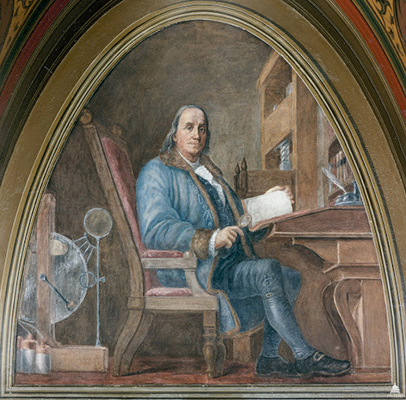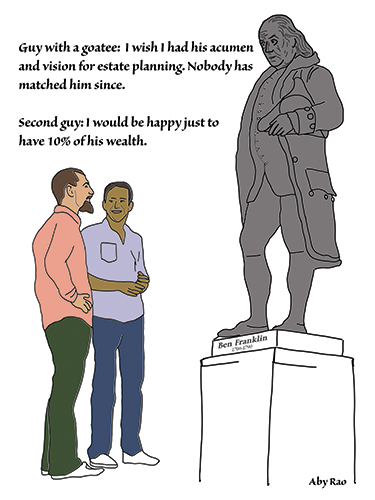
Most of us know Benjamin Franklin as one of the country’s Founding Fathers, in fact he was the most balanced minded, innovative and forward-looking leader amongst them. But those are all well-known facts, we learn about them in school at one time or the other. If not, I strongly believe that they should because there is much to learn from his life and we should all emulate him as much as possible. Some of the wise and witty sayings that we hear, use and follow are coming from him; maxims such as “God helps those who help themselves” or “Early to bed, early to rise make a man healthy, wealthy and wise.” There are over 60 such maxims associated with him and they are all very unique. There is a nice museum in Philadelphia (and Boston too) which is dedicated to him and his rich life and most of the articles and books written about him use that as a reference.
Born in January 1706 to an immigrant family from England, the youngest of 14 siblings, he grew up in a very crowded house in Boston. At a young age he ran away from home and started working for his brother as a printer in Philadelphia and then as a publisher where he learned much and he was already beginning to show by then many of his leadership and entrepreneur’s skills. He became Postmaster of Philadelphia in 1737. By now his scientific curiosity started showing too. Ben was curious about all manners of things and he loved to tinker. Swim fins, properly ventilated heating furnace and fireplace, odometer, bifocals (called double focals at the time), writing an Almanac, and paper currency were just a few of his inventions and we know all about his experiments with static electricity. Franklin, along with Jefferson, Adams, Sherman and Livingston drafted the Declaration of Independence.
My focus here though is on his skillful handling of his large estate and his estate planning ideas. To be sure when he started in business, he was downright poor and had very little to show for. By working hard, innovating, persevering and struggling in his business deals, he eventually became one of young America’s wealthiest and most respected citizens. I also might add he knew a thing or two about math and the compounding of interest. We will touch on it later.

For those who are curious, a version of Benjamin Franklin’s last Will and Testament is available online from the Franklin Institute. Included is a codicil to the original will that should perk anybody’s interest. Franklin had become one of the wealthiest persons in the Union at the time which is evidenced by the number of homes, land and the valuables he details in his will. Franklin left his property in and around Philadelphia to his daughter and her husband for the remainder of their lives. He directed that after they pass away, the property be given to their children. This created a “life estate” for the daughter and her husband. Franklin also left instructions as to how the property should be handled if any of his grandchildren should pass away before their parents and what should be done if any of the grandchildren were still minors when their parents pass away.
He also gave his property around Halifax, Nova Scotia, Canada to his son, even though his son was not very loyal to him and he worked for the British forces when the fight for the Independence was happening.
But what comes next is the most important thing to remember. In his will, he bequeathed 1000 pounds sterling each to the cities of Boston and Philadelphia, worth roughly $119,000 in 2019 dollars with the instructions that much of the money remains untouched for 100 years and the rest untouched for 200 years. His attachment to the cities was clear; he was born and brought up in one and he ran successful businesses in the other from his young age.
The money could be used to lend at 5 percent annual interest rate to help apprentices under the age 25 to start businesses. Remember, that is exactly what he had done himself; of course, he did not have anyone lending him money and he had to struggle through it all. He calculated in his will that if this plan is executed and succeeds as projected without interruptions for one hundred years the sum will be then equivalent to $15.6 million of today’s dollars.
We will not worry about the numbers he had projected because I wish to focus on his estate planning ideas. The managers of each city, he wrote, would be permitted to spend a fraction of that for public works and the remaining to be continued to be loaned to up and coming apprentices like carpenters, shoemakers, bakers, tailors, blacksmiths and clockmakers.
At the end of the 200 years which will bring us to 1990 (he died in 1790), he instructed that some funds to be distributed to the inhabitants of Boston and Philadelphia and rest to the two states for their use as they wished. In 1990 the two trusts were terminated as stipulated by Franklin.
No one before or since has set aside funds and money for 100 and 200 years, and with such great details as to how he wished his funds to be disposed. It is his vision (all for the country and its people) his planning and attention to details that need to be admired. I have mentioned in these articles about the power of compounding a few times and here is a glaring example of how it was used in his will by none other than one of our Founding Fathers.
———
Mo Vidwans is an independent, board-certified financial planner. For details visit www.vidwansfinancial.com, call +1 (984) 888-0355 or write to [email protected].



